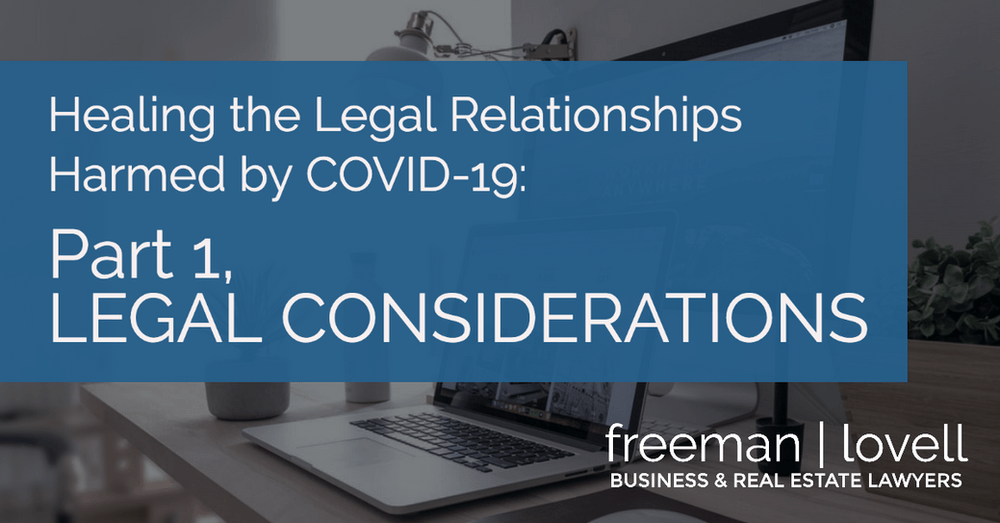Last Friday, in a Freeman Lovell webinar, Josh Freeman and Michael Thomas discussed the impact of COVID-19 on legal relationships. This post is a supplement to that webinar. A recording of the webinar is embedded in the below post, or you can watch it HERE .

Written by Michael Thomas
A less accounted-for, but deeply felt, impact of the COVID-19 outbreak is the strain it is putting on some previously functional legal relationships. It didn’t take long for COVID-19 to start impacting legal issues. To take one early example, a Florida judge ruled earlier this month that a divorced emergency room doctor’s timesharing rights with the couple’s 4-year-old would be temporarily suspended “in order to protect the best interests of the minor child.”
Family law is not the only area that is changing. What about service providers? What happens when there is a dispute about a contract with a client? How should businesses interact with customers? Should employers require employees to come to work once a Stay-at-Home order is lifted? And what about landlords and tenants? Are leases still enforceable during a pandemic?
Considerations for business owners
It can be hard to know where to start when deciding what steps to take as you get back to business. Here are a few key considerations.
Statutes and Regulations
The first place each business needs to do is to look at what liability they are open to depending on the statutes and regulations that oversee that type of business. For example, the Utah State Legislature has approved a new Bill ( H.B. 3007 ) that gives immunity from negligence claims related to COVID-19 exposure on a business's premises (pending Governor veto or signature). For example, that means that if a customer is exposed to COVID-19 from another individual while on a business's premise, the business would not be liable. That does not mean that businesses can be reckless in their precautions to avoid the spread of COVID-19 without repercussions. Plus, if a business falls under OSHA or local health codes, they must maintain those standards. (If you have any questions about how this new Bill may affect your business, feel free to contact us . )
Contractual Obligations
Businesses and individuals should take a look at what contractual obligations they are subject to. Despite COVID-19 uprooting normal life, most contractual obligations will remain in place, subject to be fulfilled and enforced.
This can be particularly tricky for contracts like Service Agreements or Leases that may have a force majeure clause. Force majeure is a common clause that may be placed in contracts that release one or both parties in a contract from certain obligations to perform when there is an extraordinary and unforeseeable event (historically described as an "act of God"). But without any specific language in a force majeure about a pandemic, there is still some debate whether the COVID-19 crisis applies to the contract. (If you would like us to review a contract, send us a message )
Case Law Precedent
Even with the unique situation, we are in, much of how judges may interpret laws and situations among COVID-19 will be established through case law precedent. There may not be much precedent when it comes to legal relationships during a pandemic, however, we can look back at other situations that may be comparable and indicate how a judge may rule in a dispute. (We can help you understand the potential results of disputes by looking back at case law precedents that may relate to your situation. Tell us about your situation . )
Business Judgement
Ultimately, how you approach the threat of COVID-19 depends in large part on how you do business. You will need to balance costs and safety. Paying for additional protective and hygienic equipment costs money may cost your bottom line even more while sales are lower than usual, but giving your customers peace of mind will be critical to keeping their trust.
Are you someone they can trust and feel safe around? A restaurant may change their dining options from dine-in to pick-up only. What will evoke trust from its customers? Facemasks, new contactless protocols, videos of cooks maintaining strict hygiene practices? What if a different restaurant had none of the workers wore masks or gloves? What if the cashier sniffles and wipes his nose with the same hand he uses to pass food to a customer? Which restaurant would you go to? Your business may not serve food or have customers visit your place of business, but as we move forward during this time, public perception of how businesses are adapting to COVID-19 will be crucial. Complying with laws and regulations is a starting point, but keeping or regaining trust will be the key to weathering the storm.
Part 2 of this post will address considerations for landlords. And Part 3 will provide an update on developments for employers. See the full webinar above.




